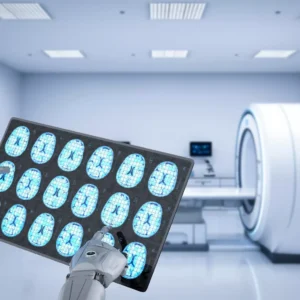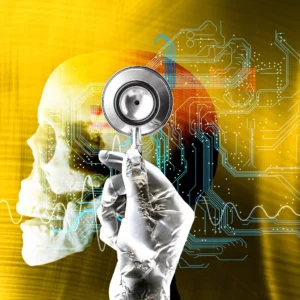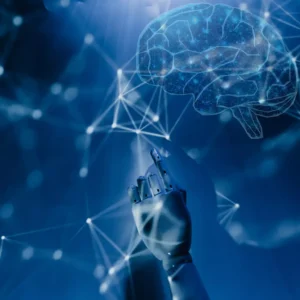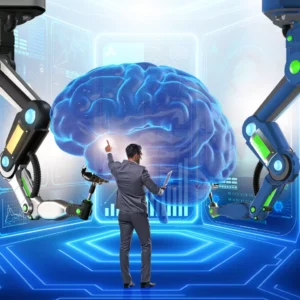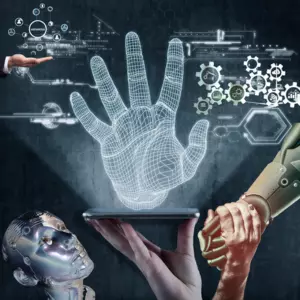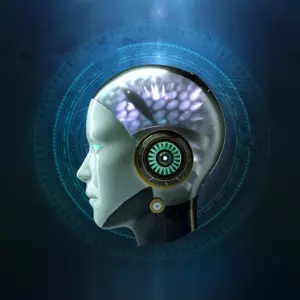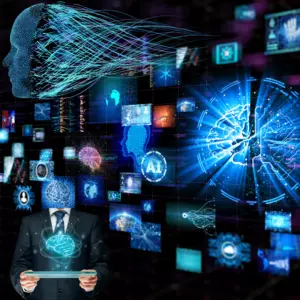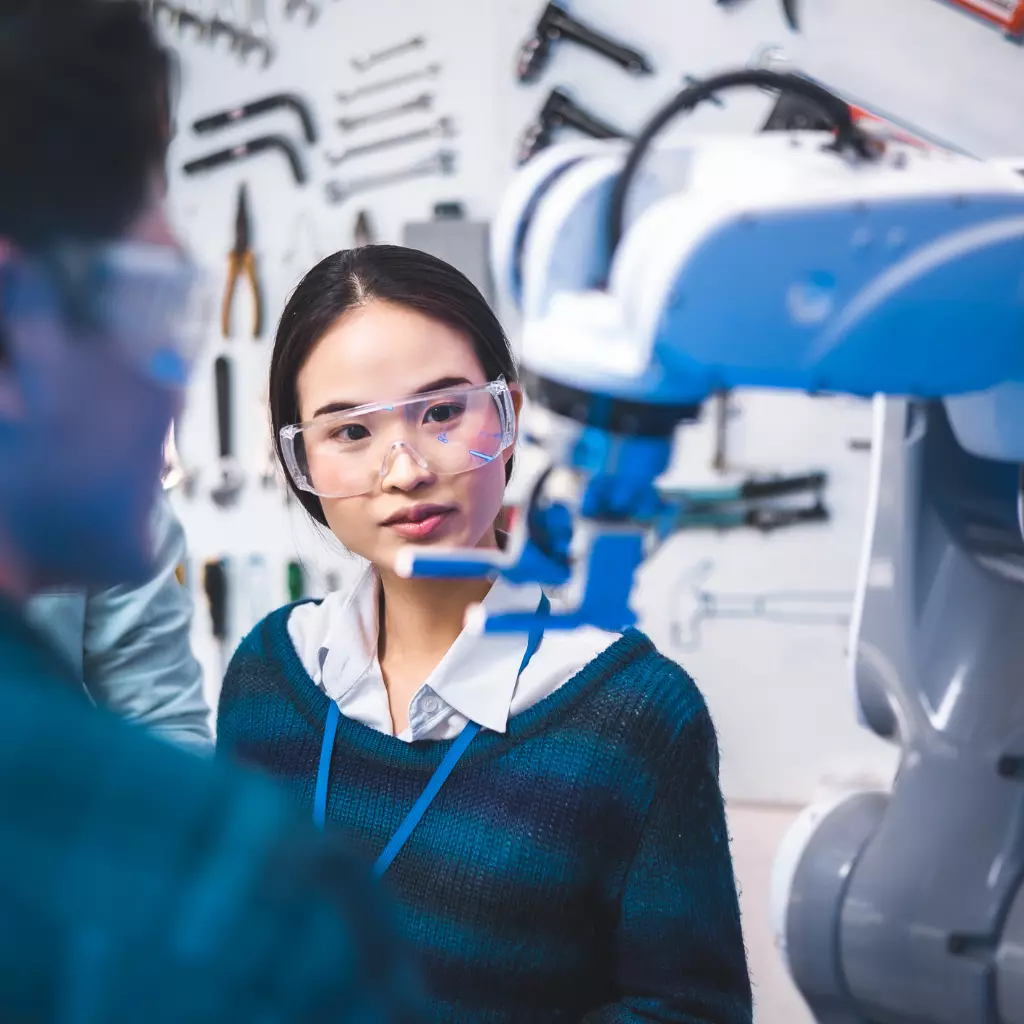
AI-Powered Drug Discovery
A Revolution in Pharma
In the ever-evolving world of pharmaceuticals, Artificial Intelligence (AI) is becoming the torchbearer of innovation. Can you believe how far we’ve come in drug discovery?
The transformation has been incredible, from simple chemical experiments to the power of AI-driven design. With the help of machines and deep learning, drug discovery is now quicker and more intelligent.
AI has genuinely revolutionized the way we approach the discovery of life-changing drugs. This article unfolds the captivating narrative of AI in modern drug development, offering insights into its profound impact on drug repurposing, clinical trials, and personalized medicine.
As we delve into molecular simulations and the software tools reshaping the industry, we spotlight a compelling case study, illuminating AI’s tangible triumphs. Yet, like all revolutions, challenges arise.
We’ll navigate through these, address ethical considerations, and gaze towards a future where AI and pharmaceuticals walk hand-in-hand to create groundbreaking therapies.
Prepare to embark on a fascinating journey into the heart of AI-powered drug discovery.
Table of Contents

Arindam Roy
An Automation Consultant with 25+ years of IT Experience
Forbes Articles related to AI usage in Healthcare:
Evolution of Drug Discovery with AI
Drug discovery, once reliant on tedious manual processes, has undergone a seismic shift with the integration of Artificial Intelligence (AI). The traditional approach involved painstaking experiments, often likened to finding a needle in a haystack. Enter AI in modern drug development.
This new paradigm leverages advanced algorithms and colossal datasets, significantly reducing discovery timelines. With AI, the approach has shifted from random trials to more targeted and intelligent investigations.
Another noteworthy transformation is predictive modelling, enabling scientists to forecast how potential drugs might behave long before tangible experiments commence. Probing existing drugs for new therapeutic applications is crucial in drug repurposing.
Gone are the days when drug discovery was primarily guesswork. With AI’s computational prowess, we’re entering an era where personalized medicine is no longer a distant dream but a near-future reality.
The evolution is clear: from manual methods to AI-powered platforms that promise precision, speed, and revolutionary breakthroughs.
Role of Machine Learning and Deep Learning
As the tapestry of AI in modern drug development unfolds, two prominent threads emerge machine learning (ML) and deep learning (DL). Machine learning, a subset of AI, utilizes algorithms that improve over time, learning from data to make more precise predictions. In drug discovery, ML algorithms sift through vast datasets to identify potential drug candidates or predict their success rates, streamlining the initial phases of development.
Then there’s deep learning, a subfield of ML inspired by the structure of the human brain. DL utilizes artificial neural networks, which excel in processing unstructured data, like images or sound. In the pharma landscape, DL shines in tasks such as molecular simulations and predicting drug interactions.
For instance, it can analyze complex molecular structures and indicate how they interact with human biology. The amalgamation of ML and DL propels AI-powered drug discovery forward, transforming it from a rudimentary trial-and-error method to a sophisticated, data-driven process.
These technologies are not just auxiliary tools; they stand at the forefront, guiding pharmaceutical AI towards groundbreaking achievements.
Advancements in Drug Repurposing
AI’s influential role in drug repurposing is a silver lining in modern drug development. This involves reevaluating approved drugs for new therapeutic uses, which traditionally requires extensive time and resources. AI, however, has changed the game.
Did you know that AI tools are making it possible to uncover new uses for drugs that have already been approved? With the help of vast biomedical datasets, these tools can quickly identify potential new roles for established medications.
It’s incredible to think about the possibilities when combining cutting-edge technology with the latest medical research! Drug repurposing with AI has been particularly beneficial in urgent scenarios. For instance, repurposed drugs can offer a swift therapeutic response when faced with sudden outbreaks or rare diseases.
AI aids in scanning existing drugs and gauging their potential against new pathogens or conditions. Its prowess in predictive modelling helps foresee drug responses, reducing the need for prolonged trials.
Moreover, personalized medicine becomes attainable as AI identifies specific drug uses for genetic profiles. Not only does this accelerate the development timeline, but it also offers cost-saving advantages. By sidestepping early-stage testing, pharma companies can swiftly bring solutions to market.
As AI in pharmaceuticals continues its upward trajectory, drug repurposing stands as a beacon of its transformative power, demonstrating how innovation can reimagine the use of existing resources.
Impact on Clinical Trial Processes
Clinical trials, the bedrock of drug development, have long been riddled with inefficiencies and lengthy durations. Enter the transformative power of AI in modern drug development. AI has ushered in a new era of optimized clinical trials, making them faster, more innovative, and more efficient.
How? By harnessing AI’s capability in predictive modelling, researchers can forecast patient responses, leading to improved patient selection and reducing dropout rates. This means trials are not only quicker but also more focused.
Furthermore, speeding up clinical trials with AI involves real-time data analysis. AI can identify potential issues early by continuously monitoring and analyzing patient data, ensuring patient safety and maintaining the trial’s integrity.
The use of AI continues beyond there. Machine learning algorithms play a pivotal role in personalized medicine, tailoring trial processes based on individual patient profiles ensuring that interventions are precise and effective.
In an industry where time is of the essence and stakes are sky-high, pharmaceutical AI ensures that the journey from the lab to the patient’s bedside is as smooth and swift as possible. Clinical trials, once cumbersome, are now rejuvenated, thanks to AI’s unparalleled influence.
Exploring Molecular Simulations
Peeling back the layers of AI in modern drug development, we find a realm where the minuscule meets the monumental: molecular simulations. These virtual simulations allow researchers to visualize and predict how molecules interact in various environments.
With the infusion of AI, these models have grown in complexity and accuracy. Molecular simulations and AI craft a synergy, enabling the rapid screening of millions of compounds to unearth potential drug candidates. Beyond mere identification, AI-driven simulations can predict how a molecule will behave, how it might bind to a particular protein or its possible side effects.
This intricate dance of predictive modelling in drug interactions means researchers can foresee challenges before they arise, ensuring safer and more effective drug designs. Another intriguing facet is the ability to simulate complex biochemical pathways, providing insights into disease mechanisms at a molecular level.
As AI-powered platforms continue to advance, they enhance the fidelity and speed of these simulations. In the vast ocean of possibilities within drug discovery, AI-driven molecular simulations are the compass, guiding researchers to promising shores faster than ever before.
AI Tools and Platforms Shaping the Industry
In the vibrant arena of AI in modern drug development, many tools and platforms emerge as game changers. These AI-powered solutions are not mere enhancements but revolutionize the industry from the ground up.
Drug design software harnesses AI algorithms to predict how different compounds can become potential drug candidates, making the initial stages of discovery exponentially efficient. Then, there are platforms dedicated to drug repurposing, utilizing AI to swiftly analyze vast databases and identify new therapeutic applications for existing drugs.
On the clinical front, AI platforms are instrumental in streamlining trial processes, optimizing patient selection, and monitoring real-time data to ensure trial efficacy. Molecular simulations and AI find a natural alliance in several tools, diving deep into the microscopic realm to forecast molecular behaviour.
As personalized medicine becomes the beacon for future healthcare, AI platforms are gearing up, ensuring treatments are tailored to individual genetic makeups. The pharma industry’s landscape is undergoing a digital metamorphosis, with AI in pharmaceuticals positioning itself at the heart of this transformation. As we navigate this brave new world, these AI tools and platforms are scripting the future narrative.
Deep Dive into a Successful Case Study
Amidst the tales of AI in modern drug development, one success story stands out, offering a testament to the potential of AI. Enter BenevolentAI, a company pioneering the marriage of AI and pharmaceuticals.
Their claim to fame: Utilizing AI for drug repurposing during the global health crisis caused by COVID-19. In a race against time, BenevolentAI’s algorithms scoured vast medical databases, identifying Baricitinib, a drug initially developed for rheumatoid arthritis, as a potential treatment.
Their predictive modelling in drug interactions showcased how this drug could combat the virus’s inflammatory effects. Clinical trials were conducted within weeks to test this insight. The result? A speedy approval for emergency use, demonstrating a breakthrough in speeding up clinical trials with AI at the helm.
This success not only underscored the pivotal role of AI in pharmaceuticals but also showcased the profound impact of AI tools in real-world scenarios. As we celebrate such triumphs, they serve as more than just isolated events.
They epitomize the power of AI, painting a hopeful picture of the countless challenges awaiting solutions in the world of drug development.
Addressing Challenges
While the promise of AI in modern drug development is undeniable, it’s full of challenges. The efficiency of AI is directly proportional to the quality of data fed into it. Therefore, the output generated by AI is as good as the data it has been trained on.
Data quality and accessibility remain paramount concerns. Fragmented or biased datasets can lead to inaccurate predictions, jeopardizing the very essence of predictive modelling in drug interactions.
Furthermore, integrating AI tools into traditional research pipelines can be daunting, requiring both infrastructural changes and a shift in mindset. There’s also the hurdle of interpretability. While AI models can make profound predictions, understanding the ‘why’ behind these decisions remains elusive, often termed the “black box” phenomenon.
This lack of transparency can be a barrier in an industry where understanding mechanisms of action is crucial. Then, there are concerns about ethical considerations in AI-driven drug development, especially when personal data is involved. In this evolving landscape, addressing these challenges is as vital as celebrating the triumphs.
Fortunately, as AI in pharmaceuticals matures, solutions are emerging. Collaborative efforts between AI experts and pharmaceutical veterans, rigorous validation processes, and transparent AI algorithms pave the way for a future where challenges are not roadblocks but stepping stones to innovation.
Ethical Considerations
The integration of AI in modern drug development has ushered in transformative changes, but it also brings forth a multitude of ethical dilemmas. As AI platforms leverage vast datasets, the sanctity of patient data privacy takes centre stage.
Ensuring that individual health records, especially in personalized medicine pursuits, remain confidential and are used responsibly is paramount. Furthermore, while groundbreaking, AI-driven drug discovery can sometimes sidestep human intuition and expertise. Blind reliance on algorithms without human oversight can lead to slips and unintended consequences.
Moreover, there’s the challenge of transparency. The “black box” nature of deep learning models can obscure understanding, posing ethical concerns, especially when unforeseen side effects or drug interactions arise. For instance, predictive modelling in drug interactions needs to be accurate and interpretable so researchers can understand and trust the decisions made by AI.
Ethical considerations also extend to ensuring equal access to drugs discovered through AI, preventing them from becoming privileges only for the affluent. It is essential to use caution when implementing AI in pharmaceuticals to ensure that innovation does not compromise ethical principles in healthcare and research.
Vision for the Future
The horizon gleams with possibilities in the ever-evolving tapestry of AI in modern drug development. Imagine a world where drug discovery is not a decade-long journey but a streamlined, precise endeavour. With AI’s continued integration, we’re heading towards a pharmaceutical renaissance.
Personalized medicine, once a lofty dream, is set to become the norm. Patients won’t just receive treatments but treatments tailored to their unique genetic makeup. The cumbersome processes of clinical trials will undergo a metamorphosis, becoming faster and more efficient, all thanks to AI-powered platforms.
Moreover, drug repurposing will likely become more prevalent, offering newer solutions to old ailments. As molecular simulations and AI converge further, we’ll gain deeper insights into the minutiae of drug interactions, enhancing the safety profile of new medicines. But this bright future has its prerequisites.
Collaborative endeavours between AI professionals and pharmaceutical experts, continuous ethical evaluations, and fostering transparency are vital. As we stand on the cusp of this new dawn in AI in pharmaceuticals, the vision for the future is clear: a world where drug discovery and development are faster, cheaper, safer, and more patient-centric than ever.
Conclusion
A revolutionary chapter unfolds as we witness the burgeoning synergy between AI in modern drug development and healthcare. AI has demonstrated unparalleled prowess in spearheading innovations — from pioneering advancements in drug repurposing to redefining the clinical trial landscape.
We’ve glimpsed the potential through successful case studies, a herald of the disruptive change AI brings to the pharma industry. However, with immense power comes great responsibility. As we navigate the intricacies of AI in pharmaceuticals, there is a pressing need to balance innovation with ethical considerations.
Moreover, constant efforts to unravel the mysteries of AI’s ‘black box’ and foster transparency will be vital. The road ahead is paved with opportunities for personalized treatments and groundbreaking discoveries. Yet, we must tread cautiously, nurturing a realm where technology serves humanity responsibly and ethically.
As we forge ahead, the mission is clear: to harmonize AI’s potent capabilities with the noble endeavour of healing, paving the path for a future that is not just advanced but also compassionate and just.
Related Articles
- AI in Telehealth: Revolutionizing Remote Care
- Navigating the Next: AI’s Role in Healthcare Predictive Analytics
- Transforming Medical Imaging with AI Capabilities in Radiology
- AI in Genetic Data Analysis: Personalizing Medicine
- AI in Diagnostics: A New Era of Precision and Accuracy
- Smart Hospitals: The Role of AI in hospital operations
- Mental Health Tech: AI-powered Mental Health Apps for Assessment and Therapy
- AI-Powered Drug Discovery: A Revolution in Pharma
- Medical Robots Enhanced by AI: Transforming Surgeries and Care
- Wearable Health Tech: AI-driven health wearables
- AI’s role in chronic disease management
- Neural Interfaces and AI: Bridging Minds and Machines
- Digital Health Platforms: The Power of AI Integration
- AI in Epidemiology: Predicting and Controlling Outbreaks
- AI in Rehabilitation: Personalized Recovery Pathways
- AI in Predictive and Preventive Care: A Proactive Approach
- AI in Home Healthcare: Personal Health Management
- Revolutionise Healthcare with IPA Tools: Streamlining Processes, Improving Efficiency, and Enhancing Patient Care
- Other Articles on AI Usage in Healthcare
- Other Articles on AI usage in different industries



